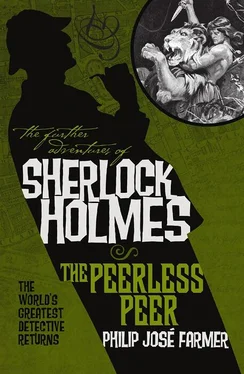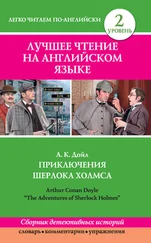Wentworth straightened up and looked at us with those strange grey eyes. “Thought I heard bats,” he said. “Wings fluttering. Giant bats. But no sign of them.”
He left the cabin then, heading down a narrow tunnel which had been specially installed so that the pilot could get into the cockpit without having to go outside the craft. His co-pilot, a Lieutenant Nelson, had been warming the motors. The commodore left a minute later after wishing us luck. He looked as if he thought we’d need it.
Presently, Wentworth phoned in to us and told us to lie down in the bunks or grab hold of something solid. We were getting ready to take off. We got into the bunks, and I stared at the ceiling while the plane slowly taxied to the starting point, the motors were “revved” up, and then it began to bump along the meadow. Within a short time its tail had lifted and we were suddenly aloft. Neither Holmes nor I could endure just lying there any more. We had to get up and look through the window in the door. The sight of the earth dropping away in the dusk, of houses, cows, horses and waggons, and brooks and then the Thames itself dwindling, dwindling caused us to be both uneasy and exhilarated.
Holmes was still grey, but I am certain that it was not fear of altitude that affected him. It was being completely dependent upon someone else, being not in control of the situation. On the ground Holmes was his own master. Here his life and limb were in the hands of two strangers, one of whom had already impressed us as being very strange. It also became obvious only too soon that Holmes, no matter how steely his nerves and how calm his digestion on earth, was subject to airsickness.
The plane flew on and on, crossing the channel in the dark, crossing the westerly and then the southwestern part of France. We landed on a strip lighted with flames. Holmes wanted to get out and stretch his legs but Wentworth forbade that.
“Who knows what’s prowling around here, waiting to identify you and then to crouch and leap, destroying utterly?” he said.
After he had gone back to the cockpit, I said, “Holmes, don’t you think he puts the possibility of spies in somewhat strange language? And didn’t you smell Scotch on his breath? Should a pilot drink while flying?”
“Frankly,” Holmes said, “I’m too sick to care,” and he lay down outside the door to the W.C.
Midnight came with the great plane boring through the dark moonless atmosphere. Lt. Nelson crawled into his bunk with the cheery comment that we would be landing at a drome outside Marseilles by dawn. Holmes groaned. I bade the fellow, who seemed quite a decent sort, good-night. Presently I fell asleep, but I awoke some time later with a start. As an old veteran of Holmes’ campaigns, however, I knew better than to reveal my awakened state. While I rolled over to one side as if I were doing it in my sleep, I watched through narrowed eyes.
A sound, or a vibration, or perhaps it was an old veteran’s sixth sense, had awakened me. Across the aisle, illumined by the single bulb overhead, stood Lt. Nelson. His handsome youthful face bore an expression which the circumstances certainly did not seem to call for. He looked so malignant that my heart began thumping and perspiration poured out from me despite the cold outside the blankets. In his hand was a revolver, and when he lifted it my heart almost stopped. But he did not turn toward us. Instead he started toward the front end, toward the narrow tunnel leading to the pilot’s cockpit.
Since his back was to me, I leaned over the edge of the bunk and reached down to get hold of Holmes. I had no need to warn him. Whatever his physical condition, he was still the same alert fox — an old fox, it is true, but still a fox. His hand reached up and touched mine, and within a few seconds he was out of the bunk and on his feet. In his one hand he held his trusty Webley, which he raised to point at Nelson’s back, crying out to halt at the same time.
I do not know if he heard Holmes above the roar of the motors. If he did, he did not have time to consider it. There was a report, almost inaudible in the din, and Nelson fell back and slid a few feet along the floor backward. Blood gushed from his forehead.
The dim light fell on the face of Captain Wentworth, whose eyes seemed to blaze, though I am certain that was an optical illusion. The face was momentarily twisted, and then it smoothed out, and he stepped out into the light. I got down from the bunk and with Holmes approached him. Close to him, I could smell the heavy, though fragrant, odour of excellent Scotch on his breath.
Wentworth looked at the revolver in Holmes’ hand, smiled, and said, “So — you are not overrated, Mr. Holmes! But I was waiting for him, I expected him to sneak in upon me while I should be concentrating on the instrument board. He thought he’d blow my a*s off!”
“He is, of course, a German spy,” Holmes said. “But how did you determine that he was?”
“I suspect everybody,” Wentworth replied. “I kept my eye on him, and when I saw him talking over the wireless, I listened in. It was too noisy to hear clearly, but he was talking in German. I caught several words, schwanz and schweinhund . Undoubtedly, he was informing the Imperial German Military Aviation Service of our location. If he didn’t kill me, then we would be shot down. The Huns must be on their way to intercept us now.”
This was alarming enough, but both Holmes and I were struck at the same time with a far more disturbing thought. Holmes as usual, was more quick in his reactions. He screamed, “Who’s flying the plane?”
Wentworth smiled lazily and said, “Nobody. Don’t worry. The controls are connected to a little device I invented last month. As long as the air is smooth, the plane will fly on an even keel all by itself.”
He stiffened suddenly, cocked his head to one side, and said, “Do you hear it?”
“Great Scott, man!” I cried. “How could we hear anything above the infernal racket of those motors?”
“Cockroaches!” Wentworth bellowed. “Giant flying cockroaches! That evil scientist has released another horror upon the world!”
He whirled, and he was gone into the blackness of the tunnel.
Holmes and I stared at each other. Then Holmes said, “We are at the mercy of a madman, Watson. And there is nothing we can do until we have landed.”
“We could parachute out,” I said.
“I would prefer not to,” Holmes said stiffly. “Besides, it somehow doesn’t seem cricket. The pilots have no parachutes, you know. These two were provided only because we are civilians.”
“I wasn’t planning on asking Wentworth to ride down with me,” I mumbled, somewhat ashamed of myself for saying this.
Holmes didn’t hear me; once again his stomach was trying to reject contents that did not exist.

Shortly after dawn, the German planes struck. These, as I was told later, were Fokker E-IIIs, single-seater monoplanes equipped with two Spandau machine guns. These were synchronised with the propellors to shoot bullets through the empty spaces between the whirling of the propellor blades.
Holmes was sitting on the floor, holding his head and groaning, and I was commiserating with him, though getting weary of his complaints, when the telephone bell rang. I removed the receiver from the box attached to the wall, or bulkhead, or whatever they call it. Wentworth’s voice bellowed, “Put on the parachutes and hang on to something tight! Twelve ****ing Fokkers, a whole staffel , coming in at eleven o’clock!”
I misunderstood him. I said, “Yes, but what type of plane are they?”
Читать дальше













